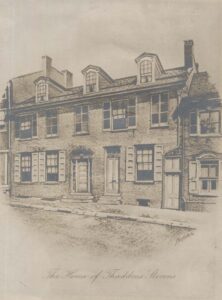Lydia Hamilton Smith: A Multifaceted Woman
On February 8, LancasterHistory hosted the inaugural wreath-laying for Lydia Hamilton Smith at St. Mary’s Catholic Cemetery. Following our long tradition of participating in such ceremonies for President James Buchanan and Congressman Thaddeus Stevens, this year, we initiated the same honors for Mrs. Smith. Remarks by LancasterHistory President & CEO Robin Sarratt were followed by a Catholic prayer for the dead read by Father Brian Olkowski of St. Mary’s Church—the congregation Smith belonged to in the 19th century. Darlene Colón, dressed as Mrs. Smith, shared a few words, as did Blanding Watson, President of the Lancaster Branch of the NAACP. The fifth speaker was Shianne Hargrove, Vice President of the African American Historical Society of South Central Pennsylvania and Marketing and Communications Coordinator at LancasterHistory. We share her eloquent remarks with you here:
Lydia Hamilton Smith, a woman of extraordinary perseverance and strength, was a multifaceted figure far beyond the narrow portrayals in the media. Her story is a beacon of resilience and determination, inspiring us all.
As a Black woman, a Lancastrian, and the Vice President of the African American Historical Society of South Central Pennsylvania, it’s an honor to celebrate the profound impact of Lydia Hamilton Smith’s life and legacy. Lydia’s dedication to her family, community and Thaddeus Stevens was unwavering. Her work as a housekeeper is well documented. However, she was much more than her occupation. Lydia’s commitment to business and civic engagement was and is a source of inspiration for many and was a testament to her entrepreneurial and community spirit.


Lydia carved a niche for herself in Lancaster and Washington, DC. As a businesswoman, she owned businesses and properties in both locations while working for Stevens. Her entrepreneurial spirit shone through when she purchased Stevens’ home on South Queen Street with the money he left for her after his death. She would later open a prominent boarding house in the DC area. Her business acumen, coupled with Stevens’ support, led her to modest wealth and comfort, a testament to her success.
Lydia joins the company of other successful Black and multiracial women of her time, such as Elizabeth Keckley, an accomplished seamstress and fashion designer in DC, and Emilie Frances Davis, a celebrated diarist and seamstress from Philadelphia. Historical Black women and women of color all have stories told in a way that honors their accomplishments without diminishing their personhood.
The experiences of Black women and women of color are not monolithic. However, there is a kindred understanding of what these identifiers mean in the 19th century and into the present day. Black women are keenly aware that we are both invisible and hyper visible in America. The intersectionality of race, gender, and class is integral to Lydia’s experience as a free woman of color in the 19th century.
The intersectionality of race, gender, and class is integral to Lydia’s experience as a free woman of color in the 19th century. These aspects define her life and are a part of her identity. Notably, Lydia experienced racial injustice and did not have a formal education, which limited her employment options. Like other people of color, Lydia did not receive the benefits of citizenship until the 14th Amendment was passed in 1866 when she was well into her 50s. But age didn’t stop her. After the 14th Amendment was passed, Lydia and other persons of color used the court to assert their rights as American citizens and pursue ligation. She sued Stevens’ estate for compensation he promised her for years of service and care.
Despite being denied, Lydia pursued her claim all the way to the Pennsylvania Supreme Court. Her parting words were:
“I wanted all that was due to me.”
Lydia Hamilton Smith’s story powerfully illustrates resilience and determination. Despite society’s limitations and expectations, she transcended the confines of the box society tried to keep her in. As a caregiver, entrepreneur, and woman, Lydia’s autonomy was not just significant; it was essential, and she fiercely defended it. As we look forward to the opening of the Thaddeus Stevens and Lydia Hamilton Smith Center of History and Democracy, we must never forget to keep Lydia Hamilton Smith’s name at the forefront of our minds as community leaders, educators, scholars, and students.
From PhotoBlog